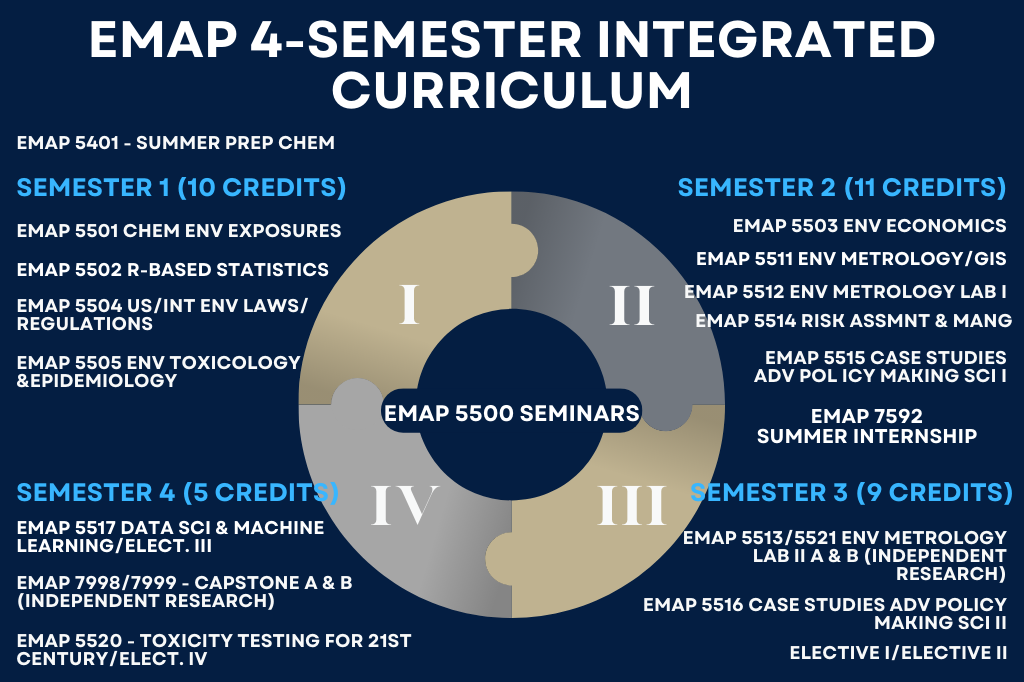Environmental Metrology Curriculum
Master in Environmental Metrology and Policy Program – for the Betterment of the World
Summer Prep Courses
- EMAP-5401: Prep Chemistry
EMAP offers a free 10-week summer intensive prep chemistry course to newly enrolled students who do not have the prerequisite chemistry courses. The prep chemistry course will prepare them adequately for the ensuing EMAP curriculum. As such, not having a college basic chemistry courses should not be an impediment for students to apply for EMAP admission. The schedule of the preparatory course follows the academic calendar of Georgetown’s summer school and usually starts on the first Monday of June. It has two 5-week sessions. The first 5-week session is on General Chemistry session and the second 5-week session is on Organic and Biochemistry session.
- Self-Directed Prep R Programming Course
The R is a popular programming language that is widely used for data analysis, data manipulation, graphics, statistical computing and statistical analysis. Particularly, EMAP 5502 Statistical Methods in Metrology is a R Studio based statistics course. As such, it is highly beneficial for students to acquire R language basics before taking EMAP 5502. For this, incoming students who do not have R language basics are strongly encouraged to take a self-directed free summer online course on R basics. Two of such courses are listed below.
Data Science: R Basics offered by Harvard University via edX
R Programming offered by Johns Hopkins University
- Self-Directed Prep Python Programming Course
Python is a popular general-purpose programming language known for its easy readability and broad library of tools for work in fields such as data science and machine learning. It is the language used in EMAP 5517 Introduction to Data Science and Machine Learning for Environmental Metrology, which is taught in Spring of Year-2. For students who intend to take this course, it is strongly recommended to take a self-directed free summer online course on Python programming basics before taking EMAP 5517. Some useful online resources are listed below.
Python 3 Programming Specialization by Michigan University
Core Courses in Environmental Metrology
- EMAP-5501: Chemistry of Environmental Exposures (Year 1-Fall)
- EMAP-5502: Statistical Methods in Metrology (Year 1-Fall)
- EMAP-5505: Occupational and Environmental Toxicology (Year 1-Fall)
- EMAP-5511: Environmental Metrology (Year 1-Spring)
- EMAP-5512: Environmental Metrology Lab I: Instrumental Principles and Measurements (Year 1-Spring)
- EMAP 5517: Data Science and Machine Learning for Environmental Metrology, (Year 2-Spring, strongly recommended but could petition to substitute it by an elective)
- EMAP-5513/5521: Environmental Metrology Lab II: Guided Independent Research (Year 2-Fall)
Core Courses in Risk Assessment and Environmental Policy:
- EMAP-5503: Environmental Economics (Year 1-Spring)
- EMAP-5514: Environmental Risk Assessment and Management (Year 1-Spring)
- EMAP-5504: US and International Environmental Laws and Regulations (Year 1-Fall)
- EMAP-5515: Advanced Environmental Policy Making Science I: A Study of Practical Cases (Year 1-Spring)
- EMAP-5516: Advanced Environmental Policy Making Science II: A Study of Practical Cases (Year 2-Fall)
- EMAP 5520: Alternatives to Animal Tests (Year 2-Spring, strongly recommended but could petition to substitute it by an elective)
All students are also required to conduct a 10-week research internship (EMAP 7952) during the in-between summer. The research project of the summer internship will be continued by the Metrology Lab II and the capstone course (EMAP 7998/7999) in Year-2.
Elective courses are as follows:
- One course in Environmental Health/epidemiology, Ethics or Justice (e.g., MICB-5589-Environmental Health & Policy, Year 2-Fall) or equivalent.
- One course in Economics, Government, or Anthropology (e.g., ECON-5551: Microeconomics, Year 2-Fall) or equivalent.
Although not earning any course credits, students are also required to attend a weekly interdisciplinary EMAP Seminar Series (EMAP 5500) each semester where leading scholars (NIST, EPA, academia) in environmental metrology and environmental policymaking present works in progress. The following EMAP 4-semester curriculum diagram illustrates the integral connections among the courses.

